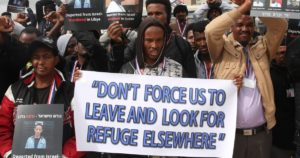Israel divided over plan to deport asylum seekers
 Israel’s plan to deport almost 38,000 mostly African asylum seekers is causing bitter and visceral divisions across the nation.
Israel’s plan to deport almost 38,000 mostly African asylum seekers is causing bitter and visceral divisions across the nation.
According to official Israeli figures and statements, more than 34,000 mostly Sudanese and Eritreans have entered Israel illegally seeking asylum.
Out of 12,136 asylum requests, only 11 were approved, compared to a 90 per cent approval rating in other countries.
Many prominent Israelis oppose the expulsion on humanitarian grounds, but other groups say most of the Africans are not genuine refugee and that their safety will not be compromised if they are sent to third countries such as Rwanda and Uganda – with which Israeli Prime Minister Benjamin Netanyahu says he has struck a deal to accept them.
Rabbis, doctors and even pilots from the national airline El Al have opposed the plans with the latter group even refusing to fly asylum seekers out of the country.
Last week, more than 800 Rabbis and other members of the Jewish clergy signed a letter urging the Israeli government to reconsider its plans.
The letter, written by Jewish faith groups New Israel Fund, HIAS, T’ruah and Right Now, calls on Israel not to deport those seeking safety within its borders, and instead, “start living up to its international responsibilities.”
“We Jews know far too well what happens when the world closes its doors to those forced to flee their homes,” the groups wrote.
Israel is offering $US3,500 payment and a plane ticket to go back to their home or a third country. Migrants have until the end of March to take advantage of the program – or risk being thrown into immigration detention.
Despite the backlash, Israeli Prime Minister Benjamin Netanyahu defended his deportation plans, saying, “Every country must monitor its borders.” In December, he also said “the overwhelming majority of the illegal migrants who’ve arrived in Israel over the past decade are neither refugees nor asylum seekers, but rather economic migrants who have come to Israel in search of work”.
In an opinion piece in Israel’s oldest newspaper Haaretz, Israeli commentator Gideon Levy said the move was “a pivotal moment in Israel’s history” and a disturbing step that could lead to more draconian moves by Israel’s conservative government.
“The next expulsion attempt could be that of Arab lawmakers from the Knesset. Everyone will deny it, but the undercurrents are there… Afterward, at some point, the real plan will be raised: To expel the Palestinians from the territories, or at least from part of them…”, Levy wrote.
“Sounds crazy? Sure. A few years ago it was crazy to think that this country of refugees would forcibly load handcuffed refugees onto planes and send them to their fate in miserable places, as it plans to do in the near future. That is why it is so important to fight now,” he said.
The bitter debate has also been manifest in the Israeli parliament, the Knesset, with a member of the left-wing Meretz party accusing members of right-wing Likud of having “Nazi friends all over the world”.
A group of El Al pilots declared they would not carry out the forcible deportations.
The pilots, who said they would not participate in “such barbarism”, were joined by 150 flight crew who took out a front-page ad in Haaretz condemning the forced transfers.
Doctors have also joined the movement with 1000 signing a letter opposing the plan and a group of rabbis led by Rabbi Susan Silverman are calling for a program of civil disobedience and offers of shelter for asylum seekers.
The rabbi says she is inspired by the sanctuary movement in the United States and by the memory of how Dutch people protected Jews in WWII.
“Anne Frank is the most well-known hidden person, and she was hidden so she would not be sent to her death – and we have documentation that these people are facing possible death,” Rabbi Silverman said.
Holocaust survivors have joined the movement, with 36 signing an open letter to the government.
The African states that are supposed to receive the refugees seem less eager about the arrangements than Israel’s PM.
Both Uganda and Rwanda say they will not take anyone forcibly deported, and deny they have signed any agreements.
But if the Israeli government offers a sufficiently lucrative package of arms and aid, it is not beyond the realms of possibility the deportations will go ahead.
Last week Amnesty International called for the removal of Israel’s signature from the UN Convention on Refugees.
“In contrast to what government representatives and ministers are saying, Israel is not standing by its commitment to the refugee’s agreement, on the contrary…” the organisation said.
Laurie Nowell
AMES Australia Senior Journalist












